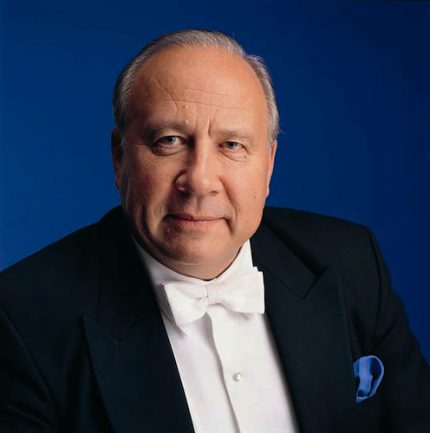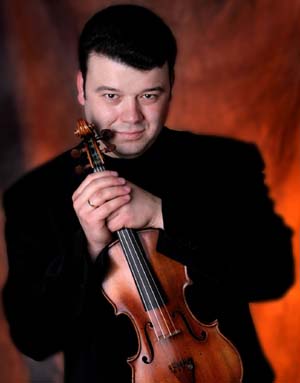Neeme Järvi makes a rewarding return to CSO
Neeme Järvi made his Chicago Symphony Orchestra debut in 1985 and for over a decade was a regular podium presence at Orchestra Hall. Affectionately regarded by collectors for his astoundingly prolific and wide-ranging discography, Järvi clicked surprisingly well with the CSO musicians, who appreciated his verve and no-nonsense direction. The partnership resulted in some excellent recordings of offbeat repertory on the Chandos label, including music of Zoltan Kodaly, Franz Schmidt and Max Reger.
After an absence of eight years Järvi returned to Orchestra Hall Thursday night for a program focused on Russian-Scandinavian repertoire, which has long been a cornerstone for him. Now 79, the Estonian conductor moves more slowly, but his music-making remains as dynamic and exhilarating as ever.
Järvi often includes at least one rarity on his programs and that certainly applied to Glazunov’s Concert Waltz No. 1, which opened the evening. Such lightish fare has largely disappeared from subscription programs (the last local performance was led by concertmaster John Weicher in 1961). While no great depths are plumbed, it’s an enjoyable, smartly scored confection, and Järvi led the orchestra in a swaying, charismatic reading, pointing the waltz rhythms deliciously and drawing personality-plus playing from the CSO winds.
Vadim Gluzman has also been absent from the CSO roster in recent seasons, his last appearance taking place in 2009 (with Paavo Järvi, Neeme’s son, conducting). Regardless, it was good to have the Russian-born violinist–a longtime Northbrook resident–back to play Prokofiev’s Violin Concerto No. 1.
The composer’s First Concerto is shorter and less flashy than its successor and less often heard for that reason. Its dedicatee Joseph Szigeti played the concerto with the CSO under Hans Lange in 1944.
Gluzman and Järvi displayed a close-knit partnership and provided strong advocacy for this lyrical work. The opening theme is one of Prokofiev’s lushest inspirations and Gluzman served it up in unapologetically glossy style, coaxing a beguiling sweet and silken tone from his remarkable instrument, the 1690 “ex-Leopold Auer” Stradivari (on extended loan from the Stradivari Society of Chicago).
There are passing acerbities in Prokofiev’s 22-minute score, which Gluzman threw off with bristling virtuosity, not least in the brief middle Scherzo. But this is predominately inward music and Gluzman made the most of its reflective pages, playing with flickering vibrato and golden tone. Järvi was a wholly sympathetic collaborator, and the final pages were beautifully done, with violin and orchestra rising to a rapt and shimmering coda.
The enthusiastic ovations–encouraged by Järvi–brought Gluzman back out for an encore. Anyone who has attended the North Shore Chamber Music Festival which Gluzman presents with his wife, pianist Angela Yoffe, every June in Northbrook, knows of his fondness for fiddle showpieces. More than in the concerto, Thursday’s audience got a glimpse of Gluzman’s serious chops with his fiery, bravura take on the final movement (“Les furies”) of Eugene Ysaÿe’s Violin Sonata No. 2.
Sibelius has long been a favored composer for Järvi and he has recorded two complete cycles of the Finnish composer’s symphonies. Others may communicate more of the austere mystery and elemental Northern atmosphere of Sibelius’s Symphony No. 5–not least Osmo Vänskä, who led the last CSO performance in 2009.
Järvi’s approach to Sibelius may seem old-fashioned in some ways, big-boned and closer to Tchaikovsky than is ideal for these late symphonies. The opening pages of the Fifth sounded rather offhand Thursday night and more sturdy than evocative. One wondered at times if some newer CSO members had trouble following the conductor’s direction–the trumpet section had a brief but jarring moment of disarray near the windup of the finale.
But there is much to be said for Järvi’s direct, unfussy approach, and the conductor laid out the narrative of the first movement clearly, drawing responsive playing with notably rich-toned string textures. The variations of the brooding middle movement were vividly characterized, and the finale built firmly and inexorably to the heroic coda, the famous, widely spaced five chords concluding the performance with emphatic weight and dramatic impact.
The symphony was preceded by Sibelius’s Karelia Suite. As in the opening Glazunov work, one was struck by the freshness and panache of this performance under Järvi. The Intermezzo went with jaunty swagger enhanced by some fine horn playing. Scott Hosteteler’s bardic English horn solo conveyed the Northern sensibility of the central Ballade, and the closing Alla marcia rounded off the suite in dancing, vivacious fashion.
The program will be repeated 1:30 p.m. Friday and 8 p.m. Saturday. CSO.org; 312-294-3000.
Posted in Performances







Posted Dec 09, 2016 at 11:21 pm by Dean Raffaelli
Neeme Jarvi is a wonderful playful conductor, though he was serious when he needed to be. To hear music from the frozen north done with joy instead of depression is exhilarating. Hopefully his partnership with the CSO will continue.
Posted Dec 14, 2016 at 12:06 pm by Mary Goetsch
Sibelius Symphony went without any brass section problems on the Friday 1:30 pm performance. But, it seemed to be a spectator sport; audience braced in suspense for the five final chords. As they progressed perfectly, one heard someone from Balcony section exclaim, “One More.” I smiled to myself as I heard nothing. Our audiences are wonderful and except for this odd incident, one can hear a pin drop throughout. Applauses are very long compared to other Chicago Land concerts.